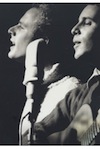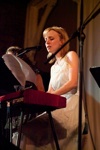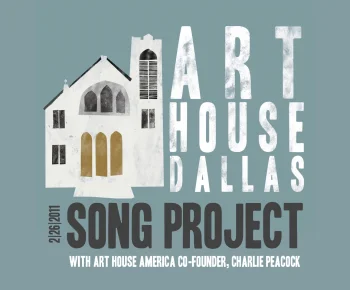In late October and early November 2011 we celebrated Art House America’s twentieth anniversary. With three events — two in our home, the Art House, and one at The Village Chapel near downtown Nashville — we looked back over twenty years of Art House history; enjoyed amazing music, beautiful food, and the company of people from all eras of the Art House America story. Twenty years still seems quite extraordinary when we look back on our beginnings.
All in Music
 Small things. Sweet tea and warm cookies. An Americano, fresh and local. Simple gifts with a profoundly Eucharistic quality. They are the work of another person’s hands; acts of attentiveness in the creation of a personal and communal experience. Simple gifts, but rich and nourishing.
Small things. Sweet tea and warm cookies. An Americano, fresh and local. Simple gifts with a profoundly Eucharistic quality. They are the work of another person’s hands; acts of attentiveness in the creation of a personal and communal experience. Simple gifts, but rich and nourishing. A good teacher is creative. A good computer programmer is creative. A good mom is creative. A good lawyer looks creatively beyond the contingencies of injustice and works to bring a more virtuous existence into being.
A good teacher is creative. A good computer programmer is creative. A good mom is creative. A good lawyer looks creatively beyond the contingencies of injustice and works to bring a more virtuous existence into being.
In fact, the argument could be made that a human being is most God-like when she is most creative, ingeniously crafting the true and the beautiful out of the confines of the present tense. Remixing tomorrow out of the raw materials of today. Re-appropriating a dream into reality.
Letter to a Young Musician
You've chosen a noble vocation. Or, perhaps music has chosen you? That's even better. An invitation is preferable to a cold call.
At all times and in all ways, you must relentlessly pursue success. That is, as long as success is defined as increased skill and ability, imagination, humility, generosity of spirit, good humor, gratitude, innovation, love, and empathy, and becoming more like Jesus, not less. Your life as a musician is an invitation to become one kind of person in the world and not another, while leaving the world a better place than when you first arrived. It is a unique calling to live a seamless, integrated, creative life before God and the world, cultivating and enjoying the gift of music. Take it seriously . . .
 My parents almost never went out alone together. They smiled giddily as they gave Jane instructions about dinner and bedtime. I paid attention. My father put his hand on my mother’s back as he opened the front door and ushered her out. Something important was happening in this moment, and it had everything to do with two fuzzy looking singers, one strumming a guitar worn high across his chest.
My parents almost never went out alone together. They smiled giddily as they gave Jane instructions about dinner and bedtime. I paid attention. My father put his hand on my mother’s back as he opened the front door and ushered her out. Something important was happening in this moment, and it had everything to do with two fuzzy looking singers, one strumming a guitar worn high across his chest. My conversion was real, but it divided us. I had no finesse in my clumsy attempts at evangelism, but I ached for him to join me, to understand. I was baptized on Coney Island in a lightning storm, and ever faithful, he stood on the beach and watched, hands dug deep in the pockets of his Levi’s. I knew he wrestled with the turn I’d taken, but we stopped talking about it. We suddenly got polite.
My conversion was real, but it divided us. I had no finesse in my clumsy attempts at evangelism, but I ached for him to join me, to understand. I was baptized on Coney Island in a lightning storm, and ever faithful, he stood on the beach and watched, hands dug deep in the pockets of his Levi’s. I knew he wrestled with the turn I’d taken, but we stopped talking about it. We suddenly got polite.The Art House Dallas Song Project: a Recap and Reflection
For anyone who is serious about having a songwriting life inspired by Jesus, it’s time to deal with what He is interested in — everything. This means people seeking God in a more beautiful, faithful way of living which is holistic in scope — beyond pietism to a true rightness, the rightness revealed in the person of Jesus and all that concerns Him.
 You might not understand or connect with those images this year or next year. But we’re not in a hurry; the Spirit’s not in a hurry. And it might be another moment at another time in a different season of life that something about one of those images really begins to mean something to you. It just takes spending time with it.
You might not understand or connect with those images this year or next year. But we’re not in a hurry; the Spirit’s not in a hurry. And it might be another moment at another time in a different season of life that something about one of those images really begins to mean something to you. It just takes spending time with it. She’s a mother, a hair stylist, a published fiction writer. Kristin Russell isn’t trying to show off. She’s just that impressive. Between her work at a hipster salon in the 12th South neighborhood of Nashville and caring for her two-year-old son Finn, her husband Rann, and her yorkie Audrey, Kristin has made the time to release her literary energy. Her attempts have resulted in a successful first novel, Recovering Ramona, a story about a “young woman who tackles her mom issues and her fears about starting a future family with the help of an eccentric hippie and a 1986 Volvo.”
She’s a mother, a hair stylist, a published fiction writer. Kristin Russell isn’t trying to show off. She’s just that impressive. Between her work at a hipster salon in the 12th South neighborhood of Nashville and caring for her two-year-old son Finn, her husband Rann, and her yorkie Audrey, Kristin has made the time to release her literary energy. Her attempts have resulted in a successful first novel, Recovering Ramona, a story about a “young woman who tackles her mom issues and her fears about starting a future family with the help of an eccentric hippie and a 1986 Volvo.” I do a fair amount of dreaming in terms of what sounds fun to do next. Who would be fun to work with? I have the luxury of being able to ask myself questions like that, and I take it pretty seriously. Josh, Sandra, and I were sitting around a few different times saying, “So what next? What am I gonna do? What follows the year I’ve just had?” And I looked at Josh with a smirk and said, “Time to make a worship record.”
I do a fair amount of dreaming in terms of what sounds fun to do next. Who would be fun to work with? I have the luxury of being able to ask myself questions like that, and I take it pretty seriously. Josh, Sandra, and I were sitting around a few different times saying, “So what next? What am I gonna do? What follows the year I’ve just had?” And I looked at Josh with a smirk and said, “Time to make a worship record.”  In the hands of another author, the blood and shame meted out in her stories would be cruel and nihilistic, a demonstration of an unfeeling universe smiting everyone alike. But O’Connor’s aim was different. She was focused at her core upon the Gospel, the arc of sin, redemption, and glorification, and though many of her stories stop short of redemption (much less glorification), redemption is the long shadow cast over the whole proceeding.
In the hands of another author, the blood and shame meted out in her stories would be cruel and nihilistic, a demonstration of an unfeeling universe smiting everyone alike. But O’Connor’s aim was different. She was focused at her core upon the Gospel, the arc of sin, redemption, and glorification, and though many of her stories stop short of redemption (much less glorification), redemption is the long shadow cast over the whole proceeding. I remember the first time someone actually purchased one of my CDs. It was 1999 at a roller-skating rink in Sacramento, California, where I was opening for a ska band (a story unto itself). The kid who made the purchase had blue hair and was probably sixteen. He handed me sweaty cash from his pocket saying, “I didn’t think I’d like you,” which I took as a compliment. Further, I took it as a sign that I’d made a connection and, as corny as it may sound, I was actually moved.
I remember the first time someone actually purchased one of my CDs. It was 1999 at a roller-skating rink in Sacramento, California, where I was opening for a ska band (a story unto itself). The kid who made the purchase had blue hair and was probably sixteen. He handed me sweaty cash from his pocket saying, “I didn’t think I’d like you,” which I took as a compliment. Further, I took it as a sign that I’d made a connection and, as corny as it may sound, I was actually moved. Mumford & Sons bring to life what America seems to long for when we give ourselves over to the nostalgia of the Depression Era. Their poetry and poise bespeak a life of hardship and loss and yet, they haven't lost the hope of redemption — the beauty of suffering, even. There’s a refreshing absence of cynicism in their lyrics that provides a contrast to the dominant American attitude of entitlement, arrogance, and individualism which is often hard to shake off.
Mumford & Sons bring to life what America seems to long for when we give ourselves over to the nostalgia of the Depression Era. Their poetry and poise bespeak a life of hardship and loss and yet, they haven't lost the hope of redemption — the beauty of suffering, even. There’s a refreshing absence of cynicism in their lyrics that provides a contrast to the dominant American attitude of entitlement, arrogance, and individualism which is often hard to shake off. As I move farther and farther away from the way I believed as a child, is there anything left to hold onto? Is it possible to believe in anything so strongly again? In the song, Rob describes his grandfather’s faith and recounts a story his grandfather told him about “a train wreck in the ’60’s,” which brings up what theologians call theodicy, the problem of the existence of evil if there is a God.
As I move farther and farther away from the way I believed as a child, is there anything left to hold onto? Is it possible to believe in anything so strongly again? In the song, Rob describes his grandfather’s faith and recounts a story his grandfather told him about “a train wreck in the ’60’s,” which brings up what theologians call theodicy, the problem of the existence of evil if there is a God. Sometimes, before I open the door, I can hear the music within.
Sometimes, before I open the door, I can hear the music within. It might be a muscular reel, a bouncy jig, or a lilting hornpipe. My pace and pulse quicken. A smile sprouts. In a moment I will see the musicians, and the faces I meet will tell me they’re glad I came, and a space will open to absorb me into the circle.
 When we first started talking about an Art House Dallas launch, we knew it needed to include three aspects: good food, live music, and opportunities to gather our Dallas friends for meaningful conversations. We imagined a handful of Dallas artists and Art House America supporters would meet together for a couple of hours to talk about what it looks like to live an “artful life.”
When we first started talking about an Art House Dallas launch, we knew it needed to include three aspects: good food, live music, and opportunities to gather our Dallas friends for meaningful conversations. We imagined a handful of Dallas artists and Art House America supporters would meet together for a couple of hours to talk about what it looks like to live an “artful life.” In a sense, Danielle is the catalyst of Raising Up the Dead. She wrote six songs — literally half of the album. Her songs are extremely well-written, and they resonate as deeply personal. “Some of them are hard to even talk about,” said Danielle. “I don’t mind sharing them in the guise of poetry and lyrics, but it’s hard to come right out and talk about them.”
In a sense, Danielle is the catalyst of Raising Up the Dead. She wrote six songs — literally half of the album. Her songs are extremely well-written, and they resonate as deeply personal. “Some of them are hard to even talk about,” said Danielle. “I don’t mind sharing them in the guise of poetry and lyrics, but it’s hard to come right out and talk about them.” Every morning, I flip on the lights to my upstairs writing room, open the window blinds, and crank up some music on iTunes to rev up my brain for writing. I sing along to hymns, Radiohead, Johnny Cash, The Shins, Emmylou Harris, and all manner of songs, as if to prepare this space artistically for our children one day. I will gladly give up this room for a kid when the time comes, so it’s like I’m painting the walls in song in preparation, which of course includes silly jazz songs, too — like the Coal Train Railroad record.
Every morning, I flip on the lights to my upstairs writing room, open the window blinds, and crank up some music on iTunes to rev up my brain for writing. I sing along to hymns, Radiohead, Johnny Cash, The Shins, Emmylou Harris, and all manner of songs, as if to prepare this space artistically for our children one day. I will gladly give up this room for a kid when the time comes, so it’s like I’m painting the walls in song in preparation, which of course includes silly jazz songs, too — like the Coal Train Railroad record. Sandra McCracken’s In Feast or Fallow is the most-played album of my life thus far. It was produced by her husband, Derek Webb, who is fast becoming one of my favorite producers, adding breathtaking layers, textures, and sounds to Sandra’s hymns that sing like the good ole Anglican hymnal I use in Church every Sunday; heck, even our prayer book.
Sandra McCracken’s In Feast or Fallow is the most-played album of my life thus far. It was produced by her husband, Derek Webb, who is fast becoming one of my favorite producers, adding breathtaking layers, textures, and sounds to Sandra’s hymns that sing like the good ole Anglican hymnal I use in Church every Sunday; heck, even our prayer book.
















